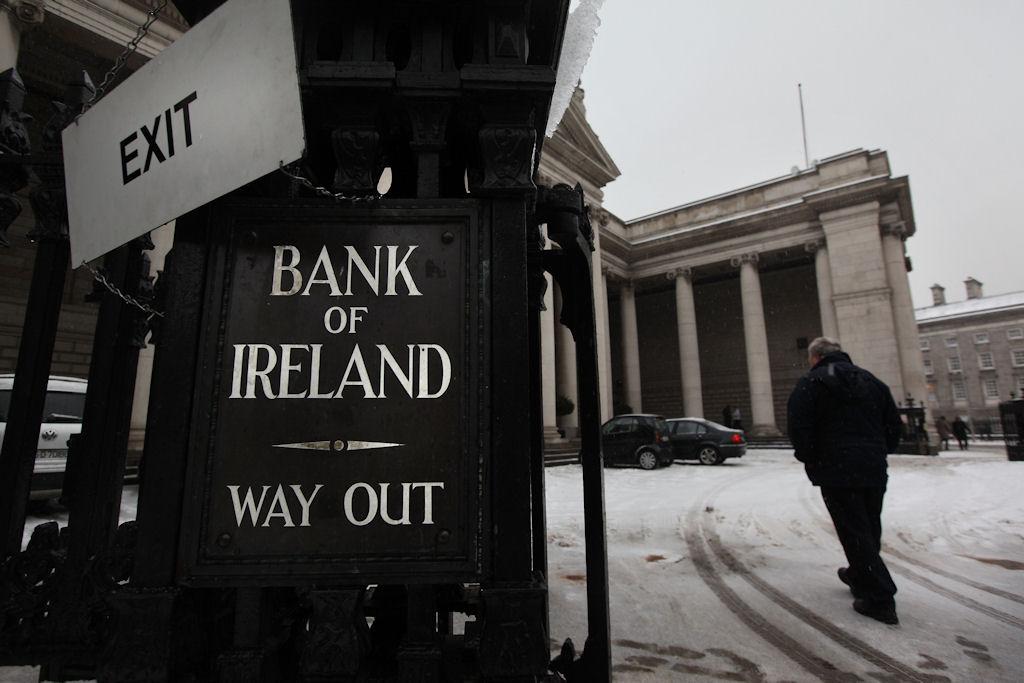Report blames Irish crisis on incompetent bankers and financial regulators
A new report on the Irish financial collapse presents a damning picture of bank managers.
DUBLIN, Ireland ─ It wasn’t a case of the dog, but the pack of dogs, that failed to bark, which resulted in Ireland being hit by a financial catastrophe that has shaken the euro zone.
That’s the conclusion of a damning report on Ireland’s banking crisis that paints a picture of a country obsessed by greed during a property bubble that collapsed three years ago.
Over six months Peter Nyberg, a senior official with Finland’s ministry of finance, compiled the 100-page report, which accuses the Irish banks of adopting a “herd instinct” to compete in irresponsible loan-making. The financial regulator, the politicians, the department of finance, the bankers, the auditors, investors and the media all bought into a culture of “let the good times roll” despite signs of an imminent collapse, according to the report, which was issued Tuesday.
Since accumulating bad loans totaling almost 70 billion euros ($101 billion), most Irish banks have been taken over by the state to prevent their collapse. The large salaries and bonuses bankers earn have angered Irish people, who must fund their losses by paying higher taxes, suffering sweeping cutbacks in social services, and watching state assets be sold off. The actions of some leading Irish bankers would have resulted in “perp walks” and prison sentences elsewhere in the world, but that has not happened in Ireland, adding to public resentment.
The previous Fianna Fail-led government was thrown out in February in the wake of the banking collapse, and there are fresh faces in the financial regulator’s office and the department of finance. However, in the opinion of many citizens, little has changed in the culture of entitlement that dominates upper levels of bank management.
On the very day Nyberg’s report was released, it was revealed that Colm Doherty, the former managing director of Allied Irish Banks, which is now owned by Irish taxpayers, received a 3 million euro remuneration package ($4.4 million) when he stepped down in November after a year in the post.
“The golden circle is alive today as it ever was,” claimed Gerry Adams, leader of Sinn Fein, the third largest party in the Irish parliament, the Dail, during an angry debate.
In the uproar, Taoiseach (Prime Minister) Enda Kenny, leader of the Fine Gael-Labour coalition government, said he, too, was “absolutely appalled to hear of this latest banker payment scandal.”
However the government’s hands are tied in such cases by pre-existing contracts that are protected by law, and more big golden handshakes are inevitable.
Analysts say the Irish legal system, which protects such contracts, and a weak parliament have contributed to the crisis.
Nyberg noted dryly that lawyers always seemed to appear every time he interviewed bankers during his six-month investigation, which was commissioned by the last government. Under the country’s 1937 constitution, Dail committees examining financial scandals are unable to compel witnesses to appear before them. In the wake of the Nyberg report, Kenny promised to hold a referendum in the autumn to amend the constitution so that politicians can conduct fact-finding inquiries.
Nyberg concluded that an “unquestioning consensus” among policymakers and financial leaders that the property market would have a soft landing was a major factor in the collapse of the Irish banks. However he identified the main cause as a “national speculative mania” centered on the sale and acquisition of property in the 2003-2007 period. He said that “large parts of society were willing to let the good times roll until the very last minute.”
The severity of the crisis was exacerbated by the global credit crunch, but the financial oversight authorities either failed to understand the data or to analyze the implications, he found.
According to Simon Carswell, Irish Times financial correspondent, “The report reflects on Ireland as a country that lost the run of itself and was obsessed with money made from a sector that would, at worst, decline only modestly.”
The report painted a picture not just of greed but of incompetence, and in this regard it singled out the leaderships of the two most culpable banks, Anglo Irish Banks and Irish Nationwide Building Society. The Finnish official also found that the independent auditors from the accounting firms to the banks, Ernst & Young, KPMG and PricewaterhouseCoopers, failed to report or act on disastrous over-lending.
Up to the end of 2008, five banks covered by a government guarantee had advanced 140 billion euros ($200 billion) in property and construction deals, where a maximum of 80 billion euros ($114 billion) was regarded as safe by financial regulators. The auditors, Nyberg noted, stayed silent.
Another dog that didn’t bark, said Nyberg, was the Irish media, which paid “relentless” attention to the property market and was dismissive of warnings that it would all end badly.
Every day, reporters and producers at The World are hard at work bringing you human-centered news from across the globe. But we can’t do it without you. We need your support to ensure we can continue this work for another year.
Make a gift today, and you’ll help us unlock a matching gift of $67,000!
